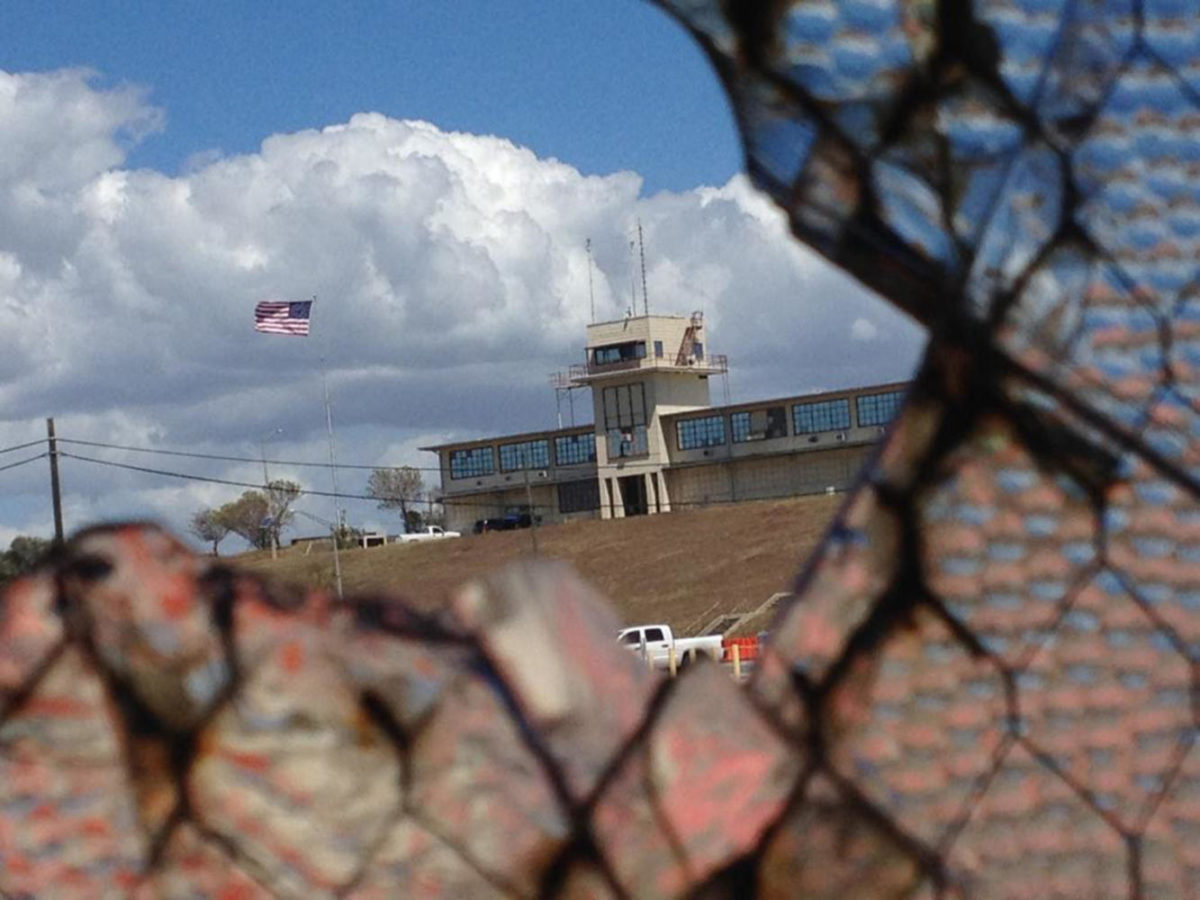Iraqi’s lawyers ask federal court for civilian medical oversight at Guantanamo
The war court headquarters at Camp Justice, as seen through a broken window at an obsolete air hangar at the U.S. Navy base at Guantanamo Bay, Cuba, on Feb. 28, 2015, in an image approved for release by the U.S. military. Defense lawyers are asking a federal judge to intervene in a ccaptive’s Guantanamo medical care. (Carol Rosenberg/Miami Herald/TNS)
September 27, 2017
Defense lawyers are asking a federal judge to intervene in the Guantanamo medical care of a captive who got two spine operations in less than a month, claiming the wartime prison has “a history of deliberate and callous indifference” to the alleged al-Qaida army commander’s health, contrary to Pentagon boasts of top-notch care.
The lawsuit filed Sept. 21 claims that the captive held as Abd al Hadi al Iraqi, 56, got emergency surgery at the U.S. Navy base hospital only after outside doctors consulted by the captive’s lawyers concluded he was at risk of paralysis from a condition damaging his spine and nervous system.
His lawyers, who call him Nashwan al Tamir, ask U.S. District Court Judge Emmet Sullivan to appoint and fund an independent medical expert to supervise his U.S. military care. They also want Sullivan to order the prison to release his full medical record to outside experts as well as his legal team. The Department of Justice has yet to file a response.
Advertisement
The request for outside supervision is extraordinary. There is no known case of a civilian judge ordering the war-on-terror prison to let an outside doctor supervise a captive’s U.S. military medical care — although federal judges have sometimes ordered independent medical examinations of Guantanamo detainees challenging their detention, or prison conditions.
Moreover, federal judges have on occasion put on hold the habeas corpus petitions of captives like al Hadi who are facing trial by military commissions at the remote base in southeast Cuba. Today, 10 of Guantanamo’s 41 captives have been charged. Al Hadi is accused of directing and funding insurgents in Afghanistan who targeted U.S. and allied troops as well as civilians after the Sept. 11, 2001, attacks.
“The deliberate indifference and disregard of the United States toward petitioner’s health and safety have put him at immediate risk of permanent paralysis or worse,” the lawyers write, “and constitute cruel and unusual punishment in violation of the Eighth Amendment.”
The habeas corpus petition offers a 10-page snapshot of the captive’s medical records, much of it in a handwritten scrawl, that shows al Hadi suffered back pain from a degenerative disc disease since soon after he got to Guantanamo from CIA captivity in 2007. The records suggest he was treated at various times for back and hip pain with traction, physical therapy such as stretching exercises, Celebrex, Motrin, an insert in his shoe and on occasion declined muscle relaxers or injections of an anti-inflammatory drug.
It also argues that “his degenerative condition has been exacerbated by the sometimes violent treatment he has experienced at the hands of prison guards,” noting a specific instance when he was forced into court using Guantanamo’s tackle-and-shackle technique called a Forced Cell extraction. That occurred in January, when he invoked a religious objection and refused to be handled by a female guard.
Lawyers said, based on letters they have received from the Iraqi, he underwent urgent surgery after becoming incontinent in his cell at the clandestine Camp 7 prison for former CIA captives.
The lawyers’ petition says the prison has refused to update them on the captive’s condition — and forbidden attorney-client meetings while he recuperates. They say they learned of al Hadi’s first surgery, conducted by a medical team rushed to remote Guantanamo ahead of Hurricane Irma, in a Miami Herald article.
Advertisement*
The surgeries also forced cancellation of an Oct. 2-6 pretrial hearing in his case. The next one is scheduled for Dec. 11-15.
At the time, Pentagon spokesman Air Force Maj. Ben Sakrisson said al Hadi’s surgery was an example of “everybody coming together and looking at this individual as a human being and providing high-quality care in a short time under an obviously stressful situation for everybody involved” — the coming hurricane that, in the end, took a more northern path and simply splashed the base.
The court filing calls the captive Nashwan al-Ramer Abdulrazzaq, a name that was used in an earlier petition to the same court that his Indiana federal public defenders withdrew in 2013 after the federal budget sequestration stripped them of funds to handle his case. His current lawyers say Nashwan al-Ramer Abdulrazzaq was his name on his Iraqi citizenship card, although he was known to family and friends as Nashwan al Tamir, “which references a family history in trading commodities.”
___
(c)2017 Miami Herald
Visit Miami Herald at www.miamiherald.com
Distributed by Tribune Content Agency, LLC.
Advertisement










